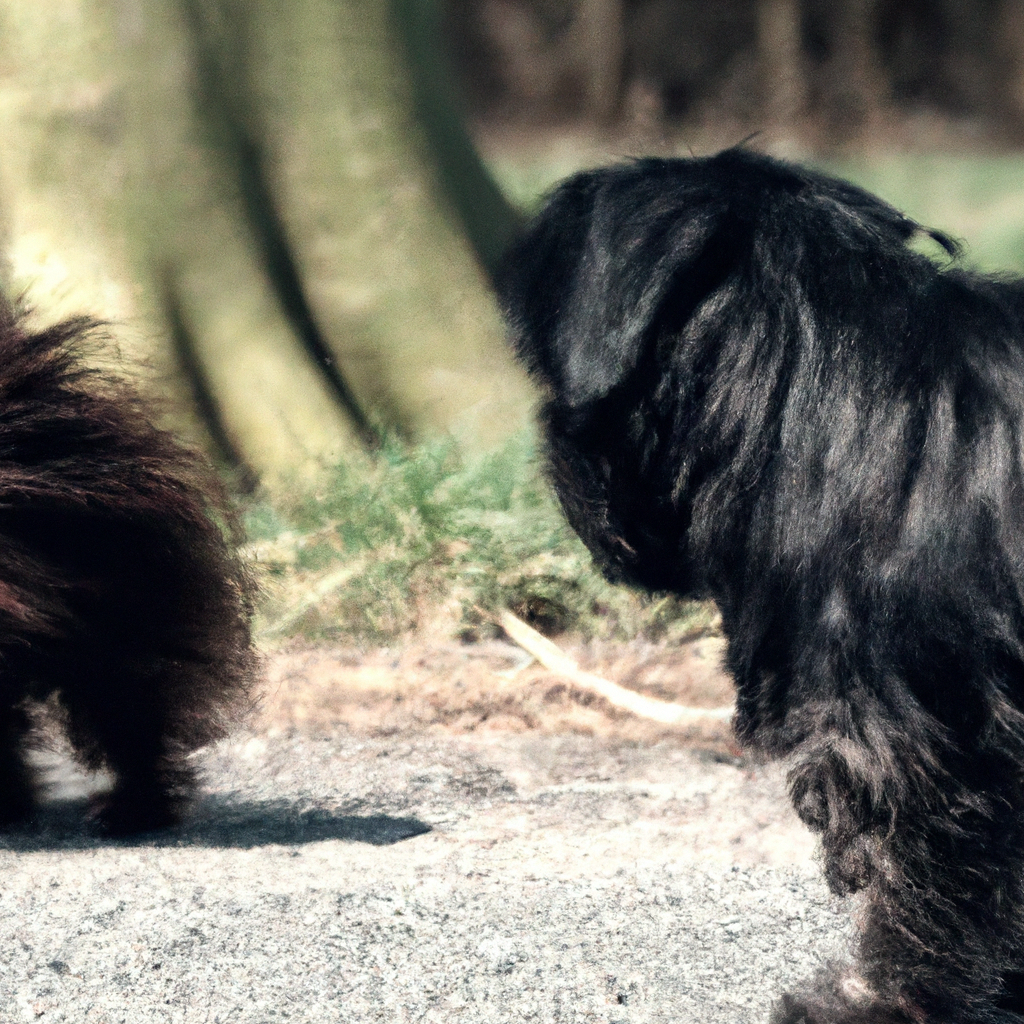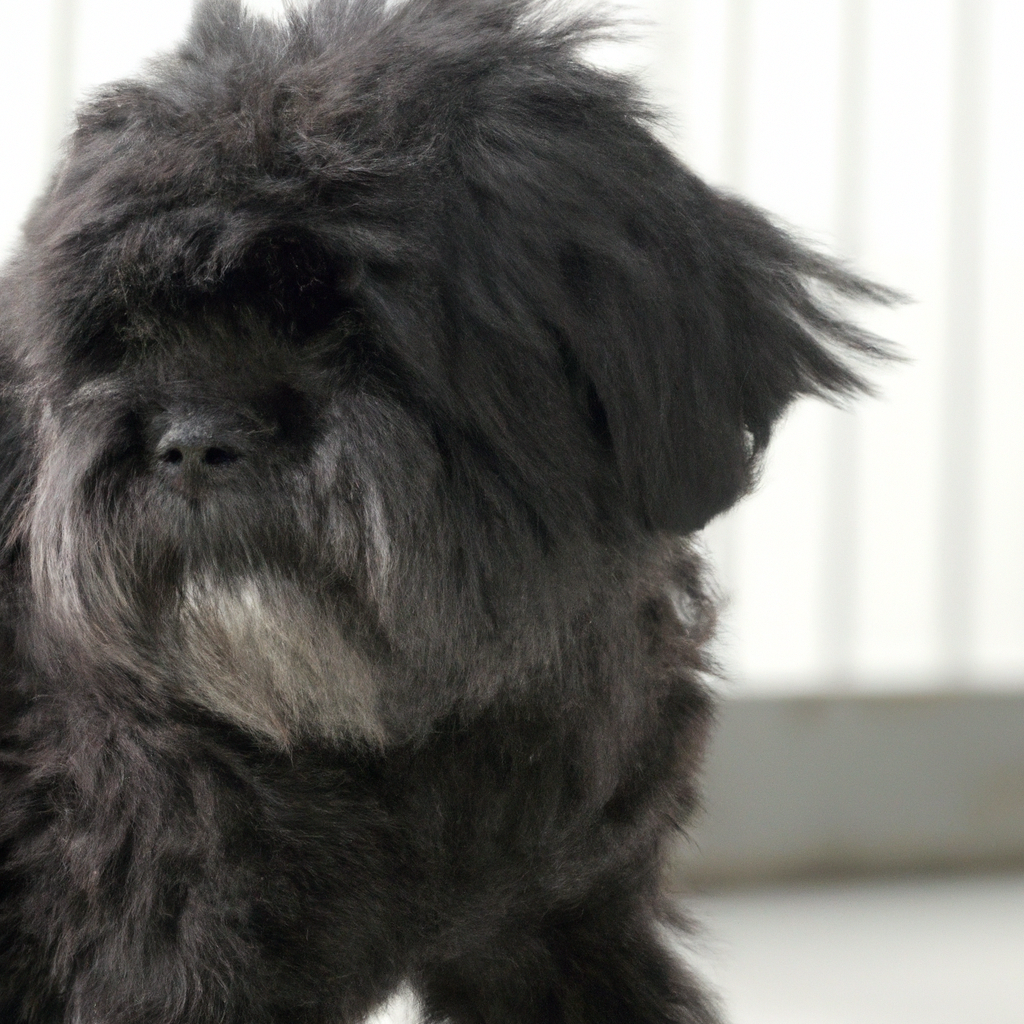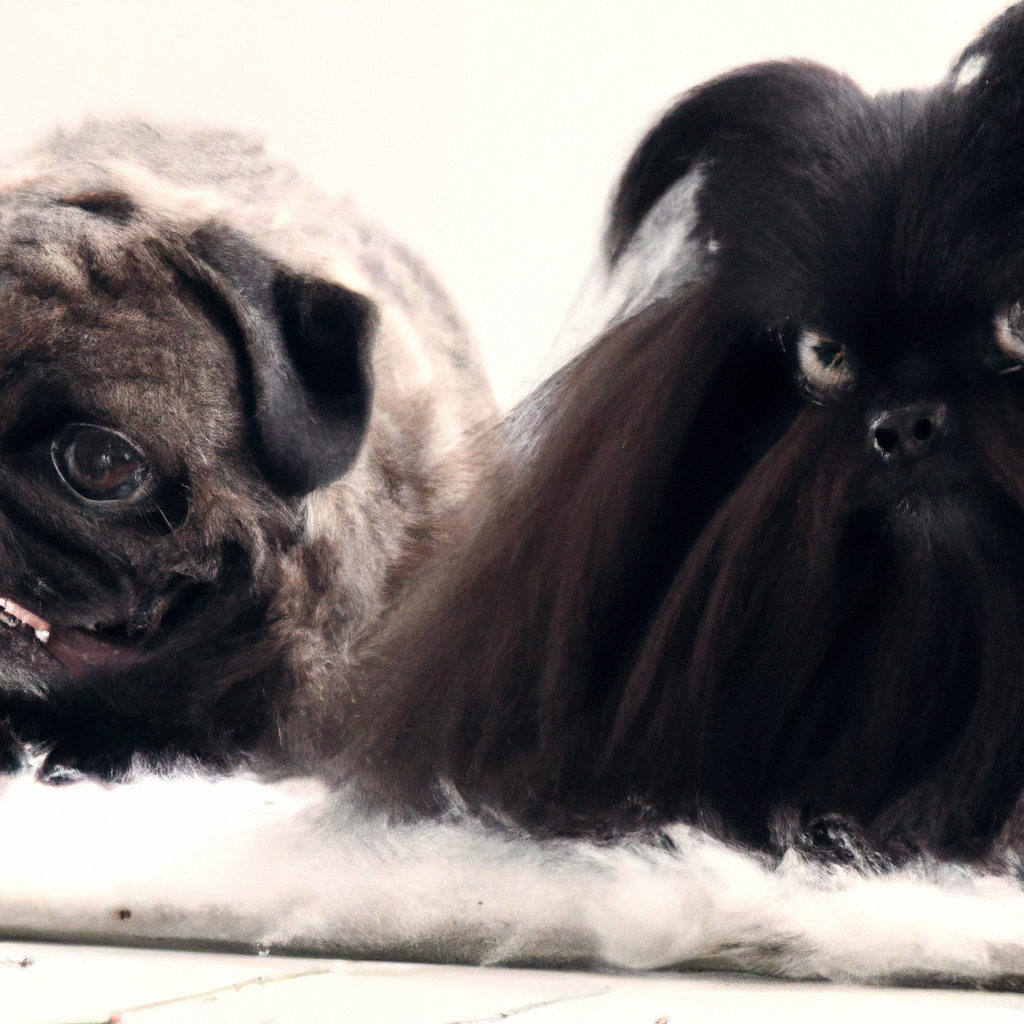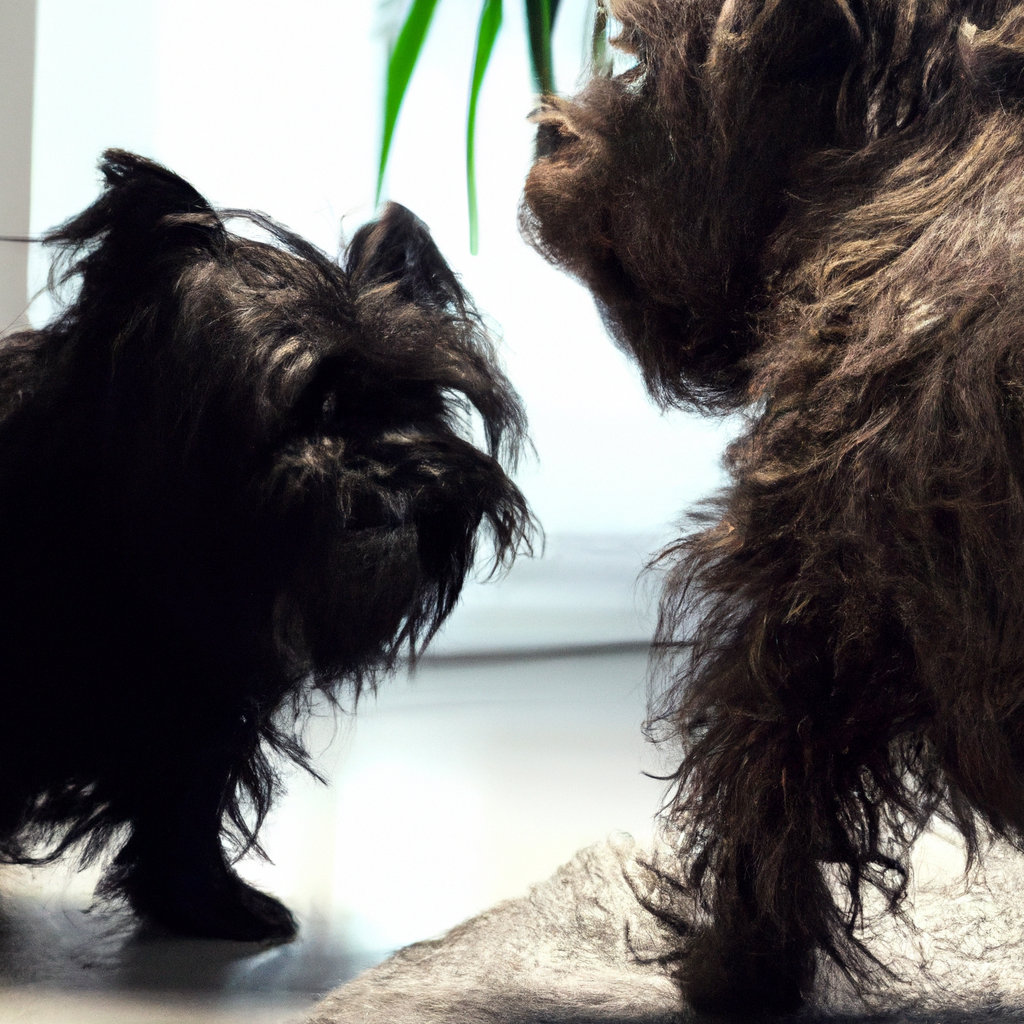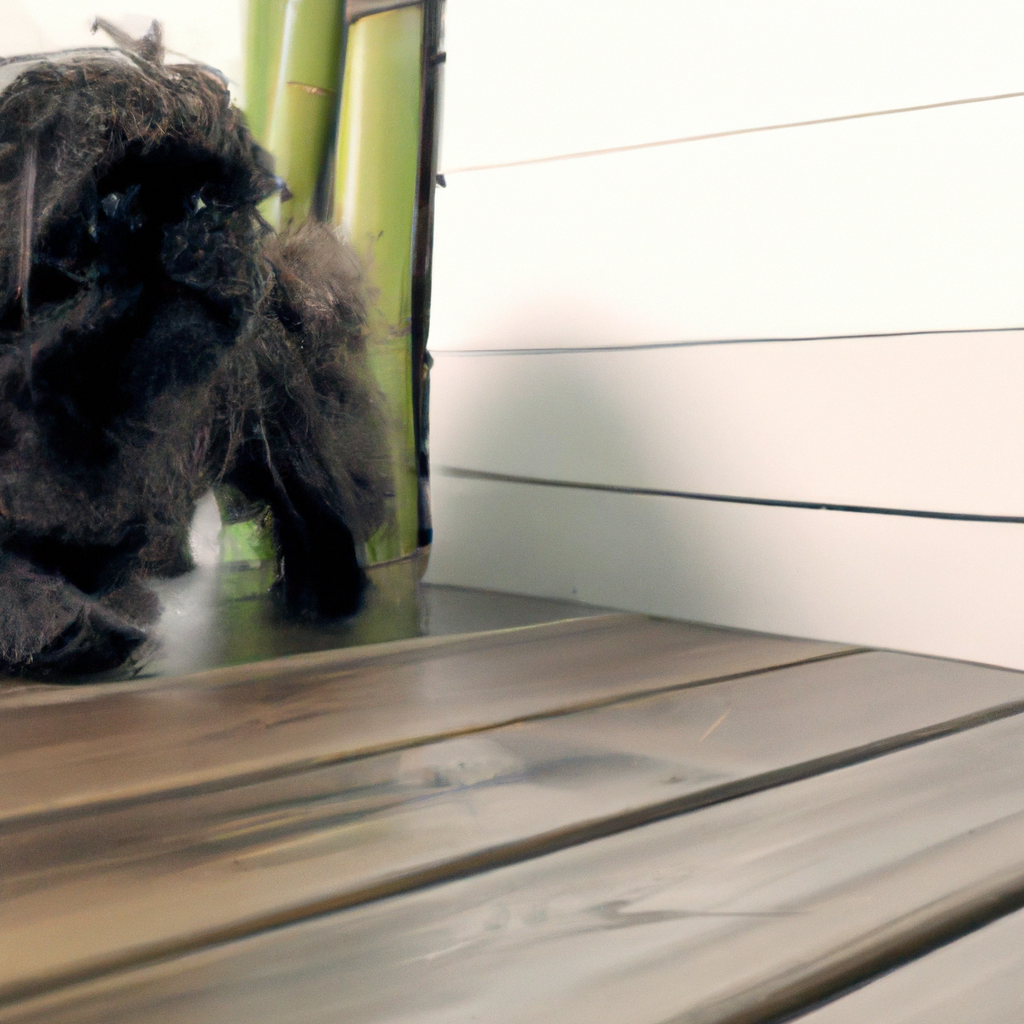Understanding Affenpinscher’s Social Behavior with Other Animals is a comprehensive study that delves into the social interactions and behaviors of the Affenpinscher breed with other animals. This exploration includes their inherent traits, temperament, and their ability to coexist with other pets. The study provides insights into their socialization needs, potential behavioral issues, and strategies for fostering positive interactions between Affenpinschers and other animals.
Understanding the Affenpinscher’s Social Behavior with Cats
The Affenpinscher, often referred to as the “Monkey Dog” due to its primate-like appearance and playful nature, is a small but feisty breed. Known for their bold and sometimes stubborn demeanor, these dogs are full of personality. But how do they fare when it comes to socializing with other animals, particularly cats? Let’s delve into understanding the Affenpinscher’s social behavior with our feline friends.
Affenpinschers are known for their lively and adventurous spirit. They are naturally curious and love to explore their surroundings. This curiosity often extends to other animals they encounter, including cats. However, it’s important to remember that every Affenpinscher is an individual, and their behavior can vary depending on their personality and past experiences.
Generally speaking, Affenpinschers can get along well with cats, especially if they are introduced to each other at a young age. Early socialization is key in fostering a positive relationship between these two species. When an Affenpinscher puppy grows up with a cat, they learn to understand and respect each other’s boundaries. This early exposure can help to mitigate any potential territorial disputes or misunderstandings that might arise.
However, it’s not always smooth sailing. Affenpinschers, like many small dog breeds, have a high prey drive. This means they have a natural instinct to chase and catch small, fast-moving creatures. This can sometimes lead to them seeing cats as potential prey, especially if the cat runs away or acts fearful. Therefore, it’s crucial to supervise their interactions and intervene if necessary.
On the flip side, Affenpinschers are also known for their fearless nature. They won’t hesitate to stand their ground if they feel threatened, even if the perceived threat is a much larger cat. This can sometimes lead to confrontations if the cat also has a dominant personality. Therefore, it’s important to monitor their interactions and step in if things start to escalate.
Despite these potential challenges, many Affenpinschers and cats have formed close, loving relationships. The key is patience, understanding, and gradual introductions. Start by allowing them to sniff each other through a door or gate. Gradually increase their exposure to each other, always under supervision. Reward positive interactions with treats and praise, and discourage negative behavior.
It’s also important to provide separate spaces for your Affenpinscher and cat, especially in the beginning. Each animal should have a safe space where they can retreat if they feel uncomfortable. Over time, as they become more comfortable with each other, they may start to share spaces and even cuddle up together.
In conclusion, while Affenpinschers can sometimes be a bit feisty and stubborn, they are also capable of forming strong bonds with cats. With patience, understanding, and careful socialization, these two seemingly different animals can become the best of friends. Remember, every Affenpinscher is unique, and their relationship with cats can vary. But with the right approach, you can help foster a positive relationship between your Affenpinscher and your feline friend.
How Affenpinschers Interact with Other Dogs
Understanding the social behavior of Affenpinschers, particularly their interaction with other dogs, is crucial for any potential or current owner of this breed. Affenpinschers, also known as “Monkey Terriers” due to their primate-like appearance, are small but fearless dogs with a big personality. They are known for their bold and protective nature, which can sometimes lead to interesting dynamics when they interact with other animals.
Affenpinschers are inherently sociable creatures. They enjoy the company of their human family members and can get along well with other dogs, especially if they have been properly socialized from a young age. However, it’s important to remember that every dog is an individual, and their behavior can be influenced by a variety of factors, including their upbringing, training, and past experiences.
Despite their small size, Affenpinschers are not afraid to stand their ground. They are often unaware of their diminutive stature and won’t hesitate to confront larger dogs if they feel threatened. This fearless attitude can sometimes lead to confrontations, especially if the other dog is not used to dealing with such a bold little character. Therefore, it’s essential to supervise their interactions with other dogs, particularly larger ones, to prevent any potential conflicts.
On the flip side, Affenpinschers can be quite playful and friendly when they feel comfortable around other dogs. They enjoy engaging in games and activities, and their energetic nature can make them a fun companion for other playful dogs. However, their play style can be a bit rough and tumble, so it’s important to ensure that the other dog is comfortable with this type of play.
Affenpinschers are also known for their strong territorial instincts. They can be quite protective of their home and their family, which can lead to aggressive behavior if they perceive another dog as a threat. This is why proper socialization is so important. By exposing your Affenpinscher to a variety of different dogs and situations from a young age, you can help them learn to navigate social interactions more effectively and reduce the likelihood of aggressive behavior.
When it comes to living with other dogs, Affenpinschers can coexist peacefully, provided they have been properly introduced and socialized. They can form strong bonds with their canine housemates and enjoy having a companion to play with. However, due to their territorial nature, it’s often best to pair them with dogs of a similar size and temperament.
In conclusion, understanding the social behavior of Affenpinschers with other dogs requires an understanding of their bold and protective nature. While they can be friendly and playful, they are also fearless and territorial, which can lead to interesting dynamics in their interactions with other dogs. Proper socialization from a young age is key to helping them navigate these interactions successfully. As an owner, it’s your responsibility to guide them through this process and ensure that they have positive experiences with other dogs. With the right approach, your Affenpinscher can become a well-adjusted and sociable member of the canine community.
The Affenpinscher’s Relationship with Birds: A Comprehensive Study
The Affenpinscher, often referred to as the “Monkey Terrier” due to its primate-like appearance and playful nature, is a small but mighty breed. Known for their bold and adventurous spirit, these dogs are a bundle of energy and curiosity. However, when it comes to their social behavior with other animals, particularly birds, it’s a different story altogether.
Affenpinschers are known for their strong prey drive, a trait that has been ingrained in them since their early days as ratting dogs in 17th-century Germany. This instinctive drive can sometimes make them a bit too enthusiastic when interacting with smaller animals, including birds. However, this doesn’t mean that Affenpinschers and birds can’t coexist peacefully. It simply means that careful, gradual introductions and constant supervision are key to fostering a harmonious relationship between them.
When introducing an Affenpinscher to a bird, it’s important to remember that the dog’s initial reaction might be one of curiosity mixed with a dash of predatory instinct. The bird, on the other hand, might feel threatened by the dog’s presence. To ease this tension, it’s recommended to keep the dog on a leash during the initial introductions, allowing the bird to observe the dog from a safe distance. Over time, the Affenpinscher will learn to see the bird as a part of its pack rather than a potential prey.
Training plays a crucial role in this process. Affenpinschers are intelligent dogs that respond well to positive reinforcement training methods. Rewarding them for calm and non-aggressive behavior around birds can help them understand that these feathered creatures are friends, not foes. It’s also important to provide the Affenpinscher with plenty of physical and mental stimulation to keep its prey drive in check. Regular exercise and interactive toys can help channel their energy in a positive direction.
Despite their initial instincts, Affenpinschers can form strong bonds with birds over time. There are numerous accounts of Affenpinschers and birds living together harmoniously, with some dogs even showing a protective instinct towards their feathered housemates. This is a testament to the Affenpinscher’s adaptable nature and its ability to form deep emotional connections with other animals.
However, it’s important to remember that every Affenpinscher is an individual with its own unique personality and temperament. While some may readily accept a bird into their pack, others might need more time and patience. It’s also crucial to consider the bird’s comfort and safety. Some birds might be more comfortable around dogs than others, and it’s important to respect their boundaries.
In conclusion, while the Affenpinscher’s relationship with birds can be complex due to their inherent prey drive, with careful introductions, consistent training, and plenty of patience, it’s entirely possible for these two very different creatures to live together in harmony. The key is to understand and respect each animal’s instincts and needs, and to provide a safe and comfortable environment for both. After all, the Affenpinscher’s spirited personality and the bird’s vibrant nature can make for a truly dynamic and entertaining household.
Affenpinschers and Small Animals: A Guide to Social Behavior
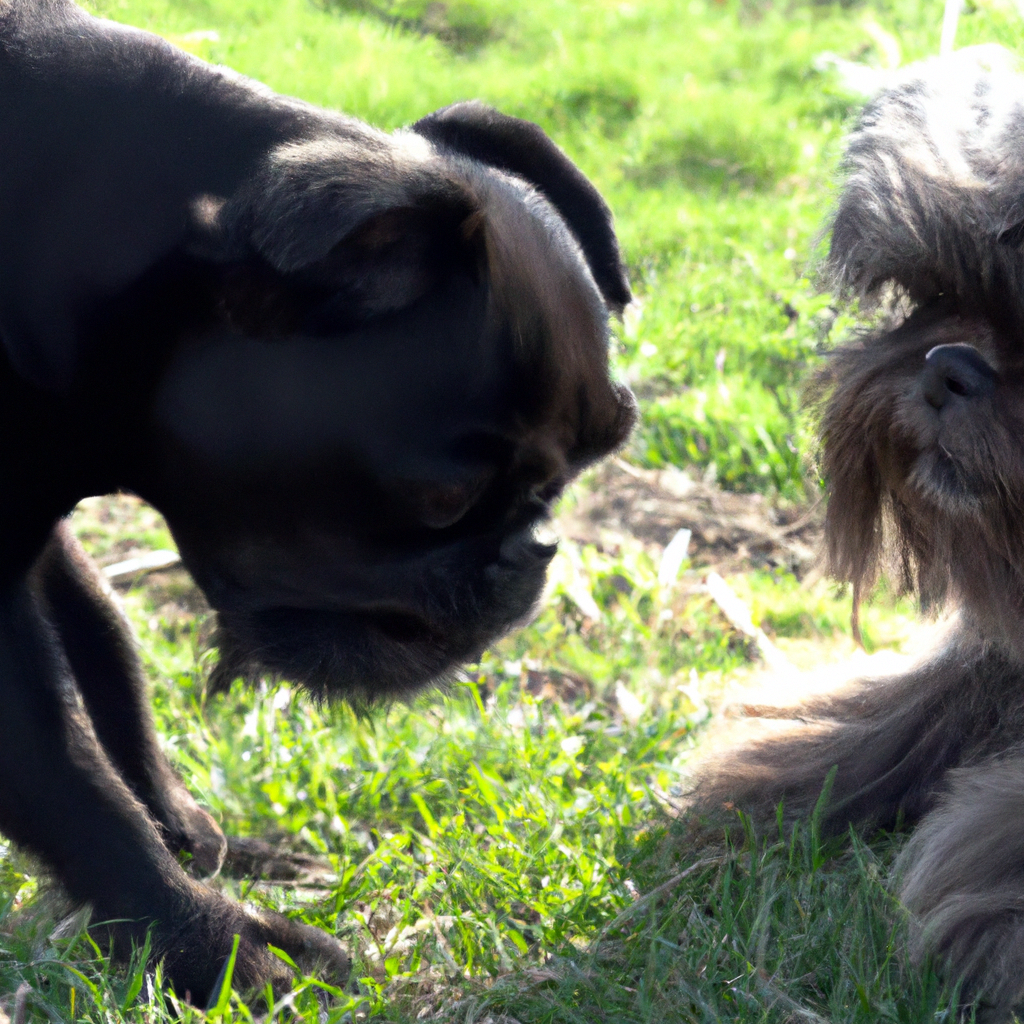
Affenpinschers, often referred to as “Monkey Terriers” due to their distinct primate-like appearance, are small but mighty dogs known for their playful and adventurous spirit. These dogs, originating from Germany, are renowned for their bold and confident demeanor, making them excellent companions. However, when it comes to their social behavior with other animals, especially smaller ones, it’s essential to understand their unique characteristics and instincts.
Affenpinschers are naturally curious and energetic, which can sometimes be mistaken for aggression. However, it’s crucial to remember that these dogs are not inherently aggressive; they are simply spirited and lively. Their high energy levels and inquisitive nature can sometimes lead them to chase smaller animals, but this is more out of curiosity than any predatory instinct.
Historically, Affenpinschers were bred to hunt rats and other small vermin, which explains their instinctual drive to chase smaller creatures. This doesn’t mean they can’t get along with other small animals, but it does mean that introductions and interactions should be carefully managed. It’s important to remember that every Affenpinscher is an individual, and while some may be perfectly fine with small animals, others may not.
When introducing an Affenpinscher to a small animal, it’s best to do so in a controlled environment. The Affenpinscher should be on a leash, and the smaller animal should be in a safe, enclosed space. This allows both animals to get used to each other’s presence without the risk of a chase occurring. Over time, as the Affenpinscher becomes more accustomed to the small animal, they can be allowed to interact more freely under close supervision.
Affenpinschers are known for their loyalty and protective nature, which can sometimes translate into possessiveness. This means that they may not take kindly to other animals, especially smaller ones, encroaching on their territory or trying to share their toys or food. Therefore, it’s important to ensure that each animal has its own space and belongings to prevent any potential conflicts.
Despite their small size, Affenpinschers are quite confident and won’t hesitate to stand their ground against larger animals. This can sometimes lead to confrontations if the larger animal doesn’t back down. Therefore, it’s important to supervise interactions with larger animals and intervene if necessary to prevent any potential altercations.
Training plays a crucial role in shaping an Affenpinscher’s social behavior with other animals. With consistent training and socialization from a young age, Affenpinschers can learn to get along well with other animals. Positive reinforcement techniques, such as treats and praise, can be used to reward good behavior and discourage unwanted behavior.
In conclusion, understanding an Affenpinscher’s social behavior with other animals requires an understanding of their unique characteristics and instincts. While they may have a natural inclination to chase smaller animals, this doesn’t mean they can’t get along with them. With careful introductions, consistent training, and proper management, Affenpinschers can learn to coexist peacefully with other animals. However, it’s always important to remember that every Affenpinscher is an individual, and what works for one may not work for another.
The Dynamics of Affenpinscher’s Interaction with Larger Breeds
Understanding the social behavior of Affenpinschers, particularly their interaction with larger breeds, can be a fascinating study. Affenpinschers, also known as “Monkey Terriers” due to their primate-like appearance, are small, fearless dogs with a big personality. Despite their diminutive size, they are known for their bold and assertive nature, which can sometimes lead to interesting dynamics when they interact with larger breeds.
Affenpinschers are inherently sociable and enjoy the company of other dogs. However, their interaction with larger breeds can be a bit of a mixed bag. On one hand, their fearless nature can make them quite assertive, even with dogs much larger than themselves. They are not afraid to stand their ground and can be quite protective of their territory and their human family. This assertiveness, while admirable, can sometimes lead to confrontations if not properly managed.
On the other hand, Affenpinschers are also known for their playful and friendly nature. They enjoy playing with other dogs and can often be seen engaging in playful bouts with larger breeds. Their small size and agile nature often give them an advantage in these playful encounters, allowing them to dart in and out with ease. This playful behavior can help to diffuse potential confrontations and foster positive interactions with larger breeds.
However, it’s important to remember that every dog is an individual, and their behavior can be influenced by a variety of factors, including their upbringing, socialization, and individual personality traits. While Affenpinschers as a breed may have certain tendencies, the behavior of individual dogs can vary widely.
For instance, an Affenpinscher that has been properly socialized from a young age is likely to be more comfortable around larger breeds. Socialization involves exposing the dog to a variety of experiences, including interactions with different types of dogs, in a controlled and positive manner. This helps the dog to learn appropriate behavior and reduces the likelihood of fear or aggression.
On the contrary, an Affenpinscher that has not been properly socialized may be more wary or aggressive towards larger breeds. This is why it’s so important to start socialization early and to continue it throughout the dog’s life.
In addition, the behavior of the larger breed can also influence the interaction. A larger dog that is calm and respectful is likely to have a positive interaction with an Affenpinscher, while a larger dog that is overly assertive or aggressive may trigger a defensive response.
In conclusion, understanding the dynamics of Affenpinscher’s interaction with larger breeds involves considering a variety of factors, including the Affenpinscher’s inherent personality traits, their level of socialization, and the behavior of the larger breed. With proper socialization and management, Affenpinschers can have positive and enjoyable interactions with larger breeds. However, it’s always important to supervise interactions between dogs of different sizes to ensure that play remains safe and positive for all involved.
Affenpinscher’s Social Behavior with Farm Animals: What to Expect
Affenpinschers, often referred to as “Monkey Terriers” due to their distinct primate-like appearance, are small but mighty dogs known for their playful and adventurous nature. These dogs, originating from Germany, are renowned for their bold and confident demeanor, making them excellent companions. However, when it comes to their social behavior with other animals, particularly farm animals, it’s essential to understand what to expect.
Affenpinschers are inherently curious and energetic, which can sometimes translate into a feisty and somewhat stubborn demeanor. This is a trait that has been ingrained in them from their early days as ratters on farms in Germany. Their job was to keep the farm free from rats and other small vermin, a task they took on with gusto. This history gives us our first clue about how Affenpinschers might interact with farm animals. They are instinctively driven to chase and catch smaller creatures, which can sometimes lead to a bit of a kerfuffle when introduced to a farm setting.
However, this doesn’t mean that Affenpinschers can’t get along with farm animals. Quite the contrary. With proper socialization and training, these little dogs can learn to coexist peacefully with a variety of animals. It’s important to remember that every dog is an individual, and while we can make generalizations based on breed characteristics, there will always be exceptions.
When introducing an Affenpinscher to farm animals, it’s crucial to do so gradually and under controlled circumstances. Start by allowing your Affenpinscher to observe the animals from a distance, gradually decreasing the space between them over time. This slow introduction allows your dog to become accustomed to the sights, sounds, and smells of the farm animals without becoming overwhelmed.
It’s also important to reinforce positive behavior during these introductions. If your Affenpinscher remains calm and behaves appropriately around the farm animals, reward them with praise, treats, or a favorite toy. This positive reinforcement helps your dog associate good behavior around farm animals with positive outcomes.
Despite their small size, Affenpinschers are known for their bravery, which can sometimes get them into trouble. They may not realize that the large cow or horse they’re barking at could easily harm them if provoked. Therefore, it’s essential to supervise interactions between your Affenpinscher and larger farm animals until you’re confident that they understand and respect the size difference.
While Affenpinschers are generally sociable dogs, they can be somewhat territorial. This trait can be beneficial on a farm, as they’ll likely take their role as protector seriously. However, it’s important to ensure that this protective instinct doesn’t turn into aggression. Regular training and socialization can help keep this trait in check.
In conclusion, while Affenpinschers may have a history as farm dogs, their social behavior with farm animals can vary greatly. With their bold and energetic nature, they may need some guidance to interact safely and peacefully with larger or more docile animals. However, with patience, training, and proper socialization, these little dogs can make a big impression on the farm.
The Affenpinscher and Aquatic Pets: A Unique Interaction
The Affenpinscher, often referred to as the “Monkey Terrier” due to its primate-like appearance and playful nature, is a small but feisty breed known for its distinctive personality. These dogs are known for their loyalty, intelligence, and boldness, making them excellent companions. However, when it comes to their social behavior with other animals, particularly aquatic pets, the Affenpinscher’s interaction can be quite unique.
Affenpinschers, like many terrier breeds, were originally bred to hunt and eliminate pests. This instinct can sometimes kick in when they encounter smaller animals, including aquatic pets. However, this doesn’t mean that Affenpinschers and aquatic pets can’t coexist peacefully. It simply means that owners need to take certain precautions and understand the breed’s natural instincts.
When introducing an Affenpinscher to an aquatic pet, such as a fish or a turtle, it’s important to remember that the dog’s initial curiosity might be driven by its hunting instincts. Therefore, it’s crucial to supervise these initial interactions closely. The Affenpinscher’s small size can be deceptive; they are known for their fearlessness and won’t hesitate to jump into action if they perceive the new creature as a potential ‘prey.’
However, Affenpinschers are also highly intelligent and adaptable. With proper training and socialization, they can learn to see other pets not as prey, but as part of their pack. This is where the owner’s role becomes vital. By consistently reinforcing positive behavior and discouraging negative reactions, you can help your Affenpinscher understand that the fish swimming in the tank or the turtle basking under the lamp is a friend, not a foe.
One effective method is to use distraction techniques. If your Affenpinscher becomes overly fixated on the aquarium, for example, redirect its attention with a toy or a treat. Over time, the dog will learn to associate the presence of the aquatic pet with positive experiences, reducing its instinct to hunt.
Another key factor in fostering a peaceful coexistence between an Affenpinscher and an aquatic pet is creating a safe space for both. Ensure that your aquatic pet’s habitat is secure and out of the dog’s reach. This not only protects the aquatic pet but also prevents the Affenpinscher from getting into potentially dangerous situations.
It’s also worth noting that every Affenpinscher is an individual, with its own personality and temperament. Some may naturally be more curious or aggressive than others. Therefore, it’s essential to observe your Affenpinscher’s behavior closely and adjust your approach accordingly.
In conclusion, while the Affenpinscher’s interaction with aquatic pets can be unique due to their hunting instincts, it’s entirely possible for them to live together harmoniously. With patience, consistent training, and a safe environment, your Affenpinscher can learn to see your aquatic pet as a part of the family. Remember, the key lies in understanding and respecting the Affenpinscher’s natural instincts while guiding them towards acceptable behavior. After all, the Affenpinscher is not just a pet; it’s a companion with its own set of emotions and instincts, deserving of our understanding and respect.
Exploring the Affenpinscher’s Social Behavior with Exotic Pets
Understanding the social behavior of Affenpinschers, especially with exotic pets, can be a fascinating journey. Affenpinschers, also known as “Monkey Terriers,” are small, fearless dogs known for their playful and adventurous nature. They are often described as having a big dog personality in a small dog’s body. However, their social behavior with other animals, particularly exotic pets, can be quite intriguing.
Affenpinschers are naturally curious and energetic, which can sometimes lead to them being a bit too enthusiastic when meeting new animals. This is especially true when it comes to exotic pets, as the unfamiliarity can pique their interest even more. However, their small size and playful demeanor can sometimes be misinterpreted by larger or more aggressive animals, leading to potential conflicts.
One of the key aspects to consider when introducing an Affenpinscher to an exotic pet is the size and temperament of the other animal. For instance, if the exotic pet is a large bird or reptile, the Affenpinscher’s playful nature might be seen as a threat, leading to a defensive reaction from the exotic pet. On the other hand, smaller or more docile exotic pets might be overwhelmed by the Affenpinscher’s energy and enthusiasm.
Despite these potential challenges, it’s important to remember that every Affenpinscher is unique, and their behavior can vary greatly depending on their individual personality and past experiences. Some Affenpinschers might be more cautious and reserved around new animals, while others might be more outgoing and eager to interact.
When introducing an Affenpinscher to an exotic pet, it’s crucial to do so in a controlled and calm environment. This allows both animals to get used to each other’s presence without feeling threatened or overwhelmed. It’s also important to monitor their interactions closely, especially in the beginning, to ensure that both animals are comfortable and safe.
Affenpinschers, like most dogs, are highly adaptable and can learn to get along with a wide variety of animals with proper socialization and training. Positive reinforcement techniques, such as treats and praise, can be very effective in encouraging positive interactions between the Affenpinscher and the exotic pet.
However, it’s also important to respect the natural instincts and behaviors of both animals. For instance, some exotic pets might be nocturnal and prefer to be left alone during the day, while the Affenpinscher might be more active and playful. Understanding and respecting these differences can go a long way in ensuring a harmonious coexistence.
In conclusion, while Affenpinschers can be quite enthusiastic and curious around exotic pets, with proper introduction, monitoring, and respect for each animal’s natural behaviors, they can learn to coexist peacefully. It’s always important to remember that every animal is unique, and what works for one might not work for another. Therefore, patience, understanding, and a bit of trial and error are often necessary when exploring the Affenpinscher’s social behavior with exotic pets.After analyzing the social behavior of Affenpinschers with other animals, it can be concluded that they generally get along well with other pets if they are socialized from a young age. However, due to their strong protective instincts and terrier heritage, they may show aggression towards other dogs, especially larger ones. Therefore, careful introduction and supervision are necessary when they interact with other animals.
